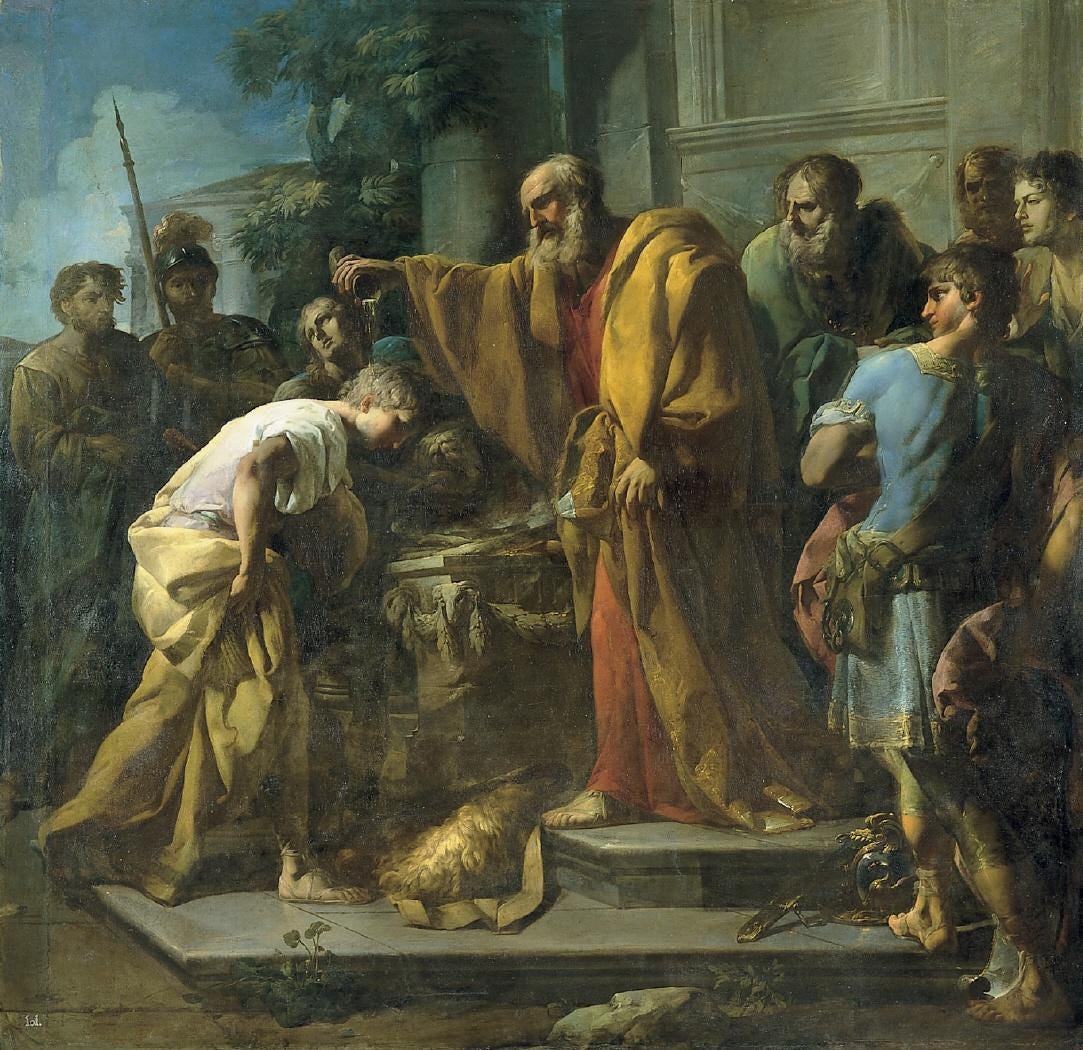“Curiosity is one of the most permanent and certain characteristics of a vigorous intellect.”1
Few men rose from the muddled ethos of the 18th century quite like Samuel Johnson. A fantastic life saw his rise from significant challenges to become “the foremost literary figure and the most formidable conversationalist of his time.”2 His comment on the value of a curious mind rings just as true today. One of my favorite axioms is the idea that in the study of the Scriptures, the weird tends to be important.3
Personally, I’m a big believer in the tremendous benefit of being generally interested.4 Making yourself a student of life positions you to enjoy every last iota it offers, growing your mind and enriching your soul to a more robust understanding of the world. For me, it manifests in little things like animal documentaries. For others, it may be custom leather boot design or culinary arts or trigonometry, but if you have something you’re passionate about, you’re in the club. We’re all wonderers.
And it’s the wonderers who excavate the deepest treasures of the Word.
Family Problems?
A boy leading sheep around the Bethlehem hills wouldn’t have cast a striking figure three millennia ago, but for most of us, the image evokes the familiar character of King David. From humble beginnings to epic battles, betrayal, scandal and a dramatic rise, he’s arguably the most popular character in all of the Tanakh (Old Testament). Warrior, poet, theologian, statesman, adventurer, musician, military genius…
… giant-killer.
Needless to say, David’s story resonates with many because it runs the gamut of human experience. His heights are heights we aspire to, and his lows are lows we despise. It’s in David’s processing of the fallout of his most infamous moment that we find an interesting — dare I say curious?— expression:
5 Behold, I was brought forth in iniquity,
And in sin my mother conceived me.— Psalm 51:5
Hmmm. Read it again. Slowly.
Remember, David is working through grief and remorse for his great sin of adultery, entrapment, deception and murder. All of this came from losing the battle of temptation with sexual immorality; his head is in that space.
That in mind, David starts talking about how he was “brought forth” and “conceived.” Hmm. Curious.
Let’s back up.
Decades earlier, the prophet Samuel was commissioned by Yahweh to anoint a new king over Israel. He was told to go to the home of Jesse the Bethlehemite, with the assurance “I have selected a king for Myself among his sons” (1 Samuel 16:1). Eight-year-old Sunday school you is probably rebooting in your temporal lobe right now. Jesse has seven sons pass in front of Samuel, only for all to be rejected due to God’s primary concern being what lies in the heart (1 Samuel 16:5-10). Confused, Samuel asks if this is indeed all the boys. Seemingly embarrassed, the father stammers that there’s still the youngest boy out in the pasture, leading the sheep through their routine. They send for him. As soon as he arrives, the Lord says “Arise, anoint him; for this is he” (1 Samuel 16:12).

Much (quite famous) history follows.
Obvious tension rears its head in the next chapter as David meets his brothers on the battle line just above the Valley of Elah, asking the soldiers about the bounty King Saul had just placed on the head of the Rephaim5 pacing back and forth down in the valley below.
28 Now Eliab his oldest brother heard when he spoke to the men; and Eliab’s anger burned against David and he said, “Why have you come down? And with whom have you left those few sheep in the wilderness? I know your insolence and the wickedness of your heart; for you have come down in order to see the battle.” 29 But David said, “What have I done now? Was it not just a question?”
— 1 Samuel 17:28-29
Definitely some subtext here. Why does Eliab seem to have it out for David?
Back to Psalm 51.
“I was brought forth in iniquity,
And in sin my mother conceived me.”
Wait a second. Iniquity? That’s a problem. Conceived in sin? As in sexual sin?
Was David illegitimate?
Some have argued so. Think about it. In the Biblical narrative, David’s mother is never named. He has strained family relationships. A slew of personal issues that spring up later in life. Maybe Jesse had an affair? Or, as the Talmudic stories say, David’s mother was married to Jesse, but the paternity (and her fidelity) was under question?6 One scholar frames it as such:
Is there a hint here that David was conceived out of wedlock? Was he sent to keep the sheep when his brothers were invited to an important occasion because as an illegitimate son he wasn’t regarded as fully one of them? It’s noteworthy that David’s mother is never named in the records, although several women and wives are listed in the chronologies of David’s family. This could explain both why David wasn’t initially considered to be a “full son” of Jesse, and could also provide a clue to David’s pattern of behaviour.7
Jesse’s youngest son — overlooked, ignored, the afterthought. Mistreated by his brothers, forgotten by his father, considered less than a full son.
Thought of as a bastard.
(DISCLAIMER: Before you clutch your pearls, I’m using the term not as a cuss word, but in the literal sense, as in a child from an illegitimate relationship.)
Considered last and least, and yet rises to become the king.
Does that sound like anyone?
Fast forward a thousand years. Same little town surrounded by the same bleating hills. A young woman betrothed to a man. A story no one believes. A scandal. A cry in the feeding trough in the middle of the night. And David’s descendant graces the stage of the world, there in Bethlehem where it all started.
But Jesus wasn’t accepted. Not by His hometown (Luke 4:24), not by his brothers (Mark 3:21; John 7:3-5) nor the religious elite. I’m sure many considered the story of Mary’s immaculate conception a joke — a blasphemous excuse to cover up a salacious tryst just before marrying the carpenter. That was the perception surrounding Jesus.
And if you claim to be the Son of God, that’s, well…
… a bit of an oddity.
Divine Fury
In the first century, the mythology of demigods loomed large against the backdrop of a thoroughly pagan and polytheistic environment. Heroes were sired directly by the gods themselves, displaying their superiority through daring deeds and tales of adventure. Larger than life characters like Heracles, Perseus, Dionysus (regarding whom I wrote on a bit previously) and others fired the imaginations of first century minds in the Mediterranean.

Fathered by Zeus, the king of the Olympian gods, these guys were straight legends. Perseus was the great monster-slayer who killed Medusa. Probably the most famous, Heracles (yes, Disney lied to you: “Herk-yoo-leez” is flat wrong) performed unbelievable feats of strength in his twelve labours and was a key player turning the tide in the Gigantomachy (war with giants).8 Heck, even Dionysus had a cult of wild revelers believing Zeus resurrected him after being torn to pieces and eaten.9 Slighting him could result in one’s own dismemberment a la Pentheús; grisly, yes, but what else are myths for?10
Being a son of the gods was a big deal.
To such an extent that Roman emperors considered themselves the embodiment of the gods. But this was nothing new.
Greece’s very own Alexander the Great, Egyptian pharaohs like Imhotep, the Imperial Chinese Tiānzǐ, Narām-Sîn of the ancient Akkadian empire, the chakravarti of Southeast Asia like Ashoka the Great — worldwide, the idea of deified kings, divine sons or avatars were identifiers for would-be rulers.
Jockeying for political power would embolden some to invoke divine right, brandishing the power of patron deities. Even the gods and demigods went to war in the divine hierarchy, like Horus contending for his father’s throne with his evil uncle Seth.11 You had to fight to rise up to be king (humans and gods alike), but your pedigree was crucial; who your father was could make or break your claim. Paternity matters.
And in the ancient world, when your paternity is in question, so are you.
Here we have a poor boy in occupied territory.
Joseph’s son — overlooked, ignored, the afterthought. Mistreated by his brothers, the product of scandal, considered less than a full son.
Thought of as a bastard.
It doesn’t matter that it wasn’t true; it was the question, hovering like a cloud over Jesus’ reputation as he grew up. Imagine that. Jesus embodied what it means to be misunderstood, to be thought of as an unworthy nothing.
Triumph
Grandfather David prophetically penned: “But I am a worm and not a man, a reproach of men and despised by the people.”12
A stanza Jesus lugged up the hill with Him and epitomized on a cross.
This was a divine son fighting, not with arrows nor a slingshot, but with self-sacrificial love in a battle against giants: sin and death and all the forces of darkness. By absorbing sin and wrestling death, He did the unthinkable and defeated it all. Ending the war.
9 For in Him all the fullness of Deity dwells in bodily form, 10 and in Him you have been made complete, and He is the head over all rule and authority; 11 and in Him you were also circumcised with a circumcision made without hands, in the removal of the body of the flesh by the circumcision of Christ; 12 having been buried with Him in baptism, in which you were also raised up with Him through faith in the working of God, who raised Him from the dead. 13 When you were dead in your transgressions and the uncircumcision of your flesh, He made you alive together with Him, having forgiven us all our transgressions, 14 having canceled out the certificate of debt consisting of decrees against us, which was hostile to us; and He has taken it out of the way, having nailed it to the cross. 15 When He had disarmed the rulers and authorities, He made a public display of them, having triumphed over them through Him.13
— Colossians 2:9-15
Christ upended the reign of terror enforced by the kingdom of the evil one. He proved His Sonship and, most beautifully, made a way for us to experience “the right to become children of God” (John 1:12). He legitimizes us as sons and daughters once again through obedient faith in His Name.
Young David faced a giant and bruised its head, passing his test of royal mettle required to rise to the throne. And the Son of David did the same, facing Humanity’s giants, bruising the head of the serpent and passing his test as He arose to take His place on the throne.14 Through that victory, you and I have access to God regardless of our social standing, our origin story, or bank account.
Was David illegitimate? Personally, I think the hermeneutical evidence points to him being the son of Jesse. There’s tons of prophetic significance to this. What I’m shining a light on is David was, like Jesus, thought to be illegitimate.
But you’re not.
Not if you’re in Christ. You can know Who your Father is, without question.
That’s worth celebrating.
Johnson, S. The Rambler. No. 103, March 12, 1751.
Folkenflik, R. (2025, January 31). Samuel Johnson | Biography, Dictionary, Quotes, & Facts. Encyclopedia Britannica. https://www.britannica.com/biography/Samuel-Johnson
Heiser, M. S. (2021, July 23). If Something in the Bible Is Weird, It’s Probably Important. Word by Word. https://www.logos.com/grow/something-bible-weird-probably-important/
Chesterton once remarked: “There is no such thing on earth as an uninteresting subject; the only thing that can exist is an uninterested person.” Chesterton, G. K. (1905). Heretics. Whitaker House. p. 22.
Goliath was descended from the Rephaim, an ancient race of demonic, half-human giants who permeated the land of Canaan. The Rephaim were also associated with the netherworld and the dead. For the Israelites, the Hebrew word rapha means “healer”, and the root for “Rephaim” shares some connection with other Semitic cognate languages. See Garris, Z. (2021, February 10). Giants in the Land: A Biblical Theology of the Nephilim, Anakim, Rephaim (and Goliath) — Knowing Scripture. Knowing Scripture. https://knowingscripture.com/articles/giants-in-the-land-a-biblical-theology-of-the-nephilim-anakim-rephaim-and-goliath; Heiser, M. S. (2023, April 27). Where are giants in the Bible other than Goliath? Word by Word. https://www.logos.com/grow/giant-in-the-bible/
GotQuestions.org. (2023, August 4). GotQuestions.org. https://www.gotquestions.org/David-mother.html
Cook, V. a. P. B. S. D. (2022, July 10). “In sin my mother conceived me” – was David illegitimate? מִקְרָא Mikra: Biblical Studies. https://stephencook.com.au/2021/01/19/in-sin-my-mother-conceived-me-was-david-illegitimate/
The Gigantomachy refers to the Greek legend of the Olympian gods battle with the giants. Heracles is instrumental in their defeat using his bow and arrows, proving his worth. See Apollodorus, Bibliotheca, 1.6.1–2 [34–38].
The Editors of Encyclopaedia Britannica. (2025, January 21). Dionysus | Powers, God, Parents, Meaning, Symbols, & Facts. Encyclopedia Britannica. https://www.britannica.com/topic/Dionysus
Pausanias, Description of Greece 2. 2. 6-7
Maydana, S. (2024, December 6). The Contendings of Horus and Seth: Clash of the Egyptian Titans. TheCollector. https://www.thecollector.com/contendings-horus-and-seth-egyptian-titans/
Psalm 22:6
Emphasis mine.
There’s a ton of serpentine imagery in the background of references to the giants, especially Goliath, and this is used a lot in 1 Samuel in general. These work together to make the connections from Genesis 3 to the Gospel accounts and the retroactive Christology going on in the Old Testament even more striking.








Yep...been teaching that for about ten years. Jesus' grandmother's in matt 1 all have a strange sexual story and were seen as scandalous. Just like Mary and the author Matthew.
Hi Kaleb - What are your thoughts on the reformed position that Ps 51:5 is not referring to his mother's sin, but the sin that all men are born with (Rom 5:12-21)? As Rom 5:19 says, "For as by the one man’s disobedience the many were made sinners, so by the one man’s obedience the many will be made righteous" (ESV). Also, iniquity is typically a hidden sin (or innate/original sin that is our flesh) compared to a transgression which is a purposeful act against God. That would make his statement in Ps 51:5 point to himself and the sin/iniquity he is conceived and then born with which is due to Adam's transgression (Rom 5:17). Would love to hear your thoughts.